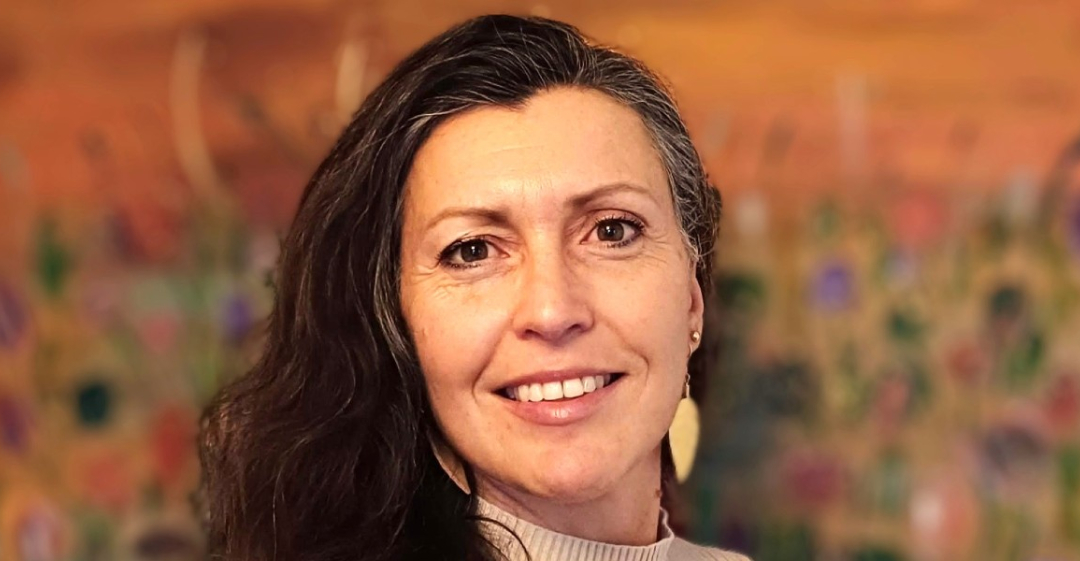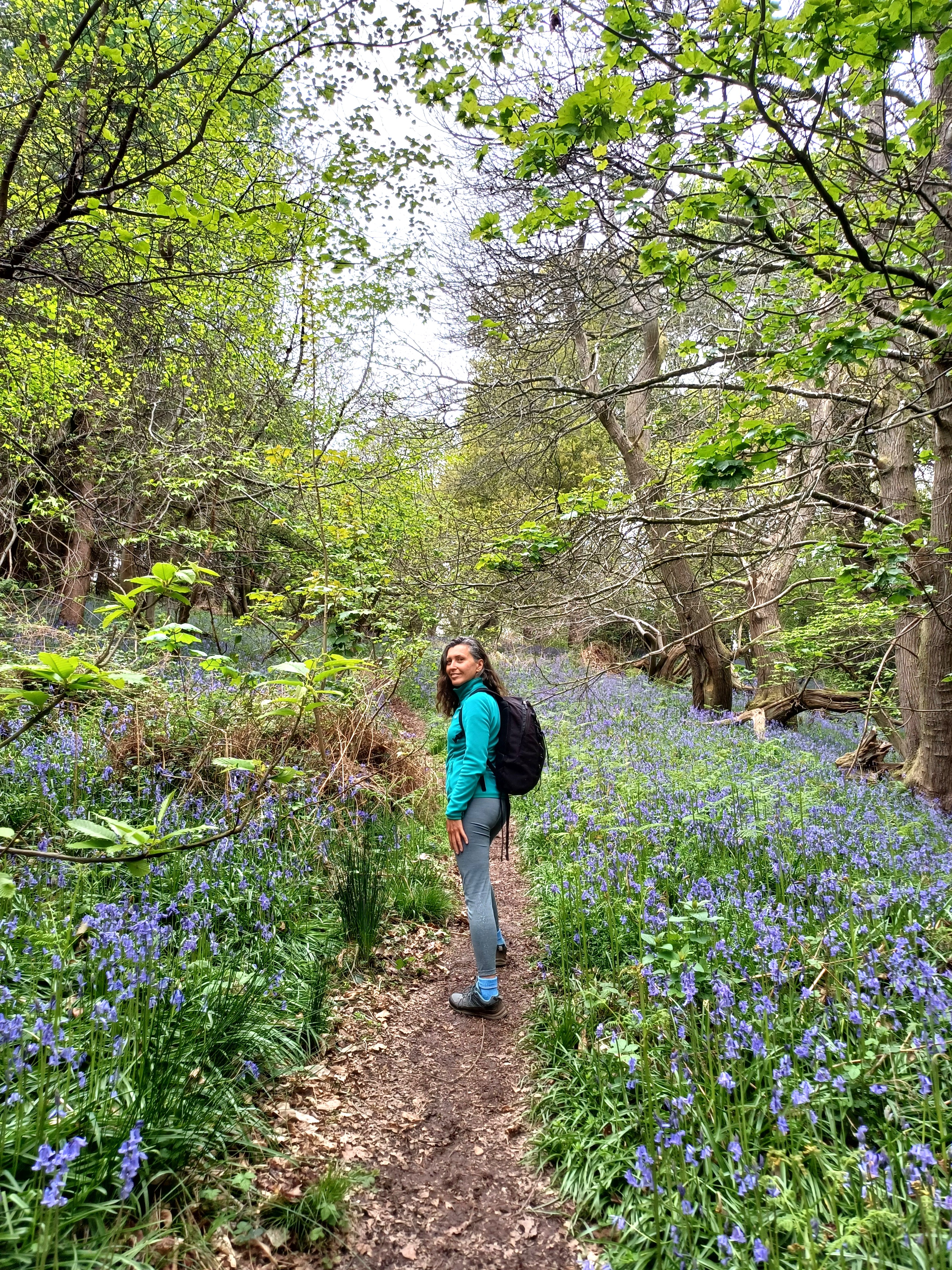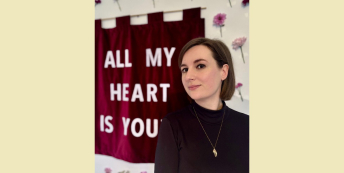"I no longer felt I could fully live my values or make the kind of meaningful impact I aspired to within that system."

What work were you doing previously?
Until July 2023, I worked as an academic researcher in sustainable transport at the University of the West of England in Bristol.
My key research interest focused on the relationship between transport and social inclusion, promoting ways of travelling that are both accessible and environmentally responsible.
I was particularly interested in how transport systems can support equity and wellbeing by enabling access to opportunities for everyone.
What are you doing now?
I now have a portfolio career as a wellbeing and personal development coach, independent researcher, evaluator, and Pilates teacher.
I gained a professional qualification in Pilates teaching after leaving academia, so I could share the benefits of mindful movement with others.
This is something that has been personally transformative in managing chronic pain from a long-term injury.
As a coach, I support individuals and organisations by blending coaching, mindfulness, somatic movement, and nature connection.
This improves wellbeing and fosters personal and professional growth. I design and facilitate outdoor wellbeing workshops.
For example, in a local cemetery that is also a wildlife haven - where I lead mindful walks and introduce reflective coaching practices to reconnect people with themselves, each other, and the natural world.
I’m currently delivering the Rail Ways of Care project, which provides free wellbeing experiences, accessible via the local rail network, to groups of unpaid carers in the area.
Why did you change?
I changed careers because the nature of my academic work, and particularly the way I was working, became increasingly misaligned with my core values.
One issue I struggled with for a long time was the exploitative model of academic publishing, where academics provide free labour while commercial publishers profit from restricting access to research.
This clashed with my values of equity and social justice.
Beyond that, I found myself disillusioned with the institutional academic culture.
The pressure to publish, outdated success and career progression metrics, limited autonomy, lack of control over my workload and project choices.
I no longer felt that I could fully live my values or make the kind of meaningful impact I aspired to within that system.
When was the moment you decided to make the change?
There wasn’t a single defining moment, but rather a growing awareness over a couple of years.
One moment that stands out was during an online introduction to a coaching course I eventually enrolled in.
When we were asked to choose an image that reflected how we felt, I chose a scarecrow. It captured how I felt at the time: exposed, unacknowledged and lonely.
As a single parent in academia, I struggled to find role models who reflected my circumstances or values.
I longed for a different way of working, rooted in human connection, care and alignment with nature.
That sense of misalignment was deeply felt, and the coaching introductory event helped me name and act on it.
How did you choose your new career?
I wanted to create a working life that aligned with the lifestyle I value and the kind of impact I want to make.
I used personal savings and made practical changes, including moving house, to make the transition financially viable.
I chose a path that enabled me to work independently, mostly outdoors, and in ways that reflect my passion for promoting wellbeing, nature connection and personal growth.
Before making the shift, I did a lot of inner work, exploring my strengths, values, and purpose, including working with a coach and in a group coaching programme for ex academics.
This reflection helped me craft a new professional path where I could bring more of myself to the work I do.
Are you happy with the change?
Yes, I’m very happy with the change.
It suits both my lifestyle and the way I want to contribute to the world.
I feel more aligned with my values, my need for autonomy, and more able to work in a way that feels human, creative and purposeful.
What do you miss and what don't you miss?
I sometimes miss the financial stability of a regular salary.
Income can be unpredictable when you're self-employed, especially early on.
I also miss having access to an IT department, but I’ve learned a great deal and now handle most things myself or outsource what I need.
What I don’t miss is being part of a large institution where it was often hard to see the direct impact of my work.
Now I get to witness the difference I make almost in real time, whether that’s supporting someone on a coaching journey, teaching Pilates, or facilitating a group workshop.
I also have the freedom to choose who I work with and what projects to pursue.
How did you go about making the shift?
I gave myself space to reflect, which was essential.
I wasn’t in a good place mentally in the months that preceded me leaving my job.
So, I turned to the things that grounded me, like walking in nature, physical activity, and meaningful connection with people.
I reached out to others in a similar situation and joined a group coaching programme for people transitioning out of academia.
I also enrolled in a reputable coaching training programme, which was both a professional investment and a personal turning point.
This helped me clarify my new direction, discover work options I didn’t even know existed, and build the skills and confidence to move forward.
How did you develop (or transfer) the skills you needed for your new role?
Some skills transferred directly.
For example, in my research and evaluation work, I draw on the same methodological competence, analytical and communication skills I used in academia.
Running a business, however, required learning new skills. I joined business networks, attended council-run training, and took online courses to understand what was needed.
My background as a researcher helped because I’m self-motivated and quick to learn.
I also completed a professional coaching programme at Masters level (accredited by the ICF), and gained my Level 3 Pilates teaching qualification.
I'm now working towards Level 4. I see learning as a lifelong process and am committed to continually developing my skills.
What didn’t go well? What wrong turns did you take?
I wouldn’t describe anything as a wrong turn.
I approached 2025 as a year of experimentation, trying different things to see what fits.
I’ve learned from everything I’ve done, even if I decide not to continue in a particular direction.
The only real wrong turn for me would be doing work that contradicts my values, but even then, it would still offer insight and learning.
How did you handle your finances to make your shift possible?
Finances were my first priority.
I needed time and headspace to reflect, and money helped me buy that time.
I used personal savings and made significant changes to my lifestyle, including moving house, to make the shift viable.
I was fortunate to have those resources, but I also made deliberate and quite difficult choices to make the transition possible.
What was the most difficult thing about changing?
Navigating uncertainty and letting go of my professional identity as an academic was the hardest part.
At times I felt like a failure and experienced a lot of vulnerability – I was 50 at the time and had to fight the belief that I was too old to change careers.
The transition wasn’t linear. It was messy and full of conflicting emotions.
I also projected my insecurities outward, imagining others saw me as a failure, when in fact I was wrestling with my own fears.
Accepting that transitions are inherently uncertain and being gentle with myself in the process was key.
What help did you get?
I made use of every form of support I could find, both paid and free.
My family, though living abroad, were emotionally supportive.
My teenage daughter said I was inspirational, and she’s been really supportive, which has been crucial.
I leaned on friends and built new networks. I went to networking events, started conversations, and talked openly about my transition, even when I wasn’t sure how to describe what I was doing.
I also used free local resources, including libraries, council-run programmes, and joined online communities on social media platforms, mainly on FB and LinkedIn.
I saw every interaction as an opportunity to learn and connect.
What have you learnt in the process?
I’ve learned that I'm resilient, adaptable, and committed to learning.
Embracing a growth mindset, seeing each step as a learning opportunity, has been vital.
I’ve also learned that there is room for everyone in a specific profession.
Even though many people offer similar services, each of us brings a unique blend of qualifications, lived experience and professional skill.
I’ve learned to let go of perfectionism, sit with discomfort, and accept that my business will evolve, in response to me evolving, and changing circumstances in the context I am operating.
What I do now may not be what I do a year from now, and that’s fine.
What do you wish you'd done differently?
There’s nothing I regret – perhaps believing more in myself a little sooner!
I did the best I could with the information and resources I had at the time. Every step has contributed to where I am now.
What would you advise others to do in the same situation?
Take time to reflect on the kind of life you want to lead, not just the job you want.
Think holistically. Use your financial resources, however limited, to create space for that reflection.
Don’t rush into a completely new career or big shift without first checking whether it aligns with your values and the life you want. Start with small steps, experiment.
Pay attention to your body as well as your thoughts. In my case, it was a gut feeling, a physical response, that told me I had to leave.
Talk to people in your networks, connect to others not yet in your network, find your tribe – people who share similar values, experiences and situations to yours.
Be curious. Learn. Share your fears and dreams.
Listen deeply to your whole self and others, without feeling pressure to act straight away.
And get your finances in order early, so you’re in a position to act in a way that’s sustainable for your circumstances.
What resources would you recommend to others?
I found Careershifters to be an excellent resource, particularly the podcast and online articles.
For those leaving academia, there are many helpful groups online, such as the “Leaving Academia” Facebook group run by Dr Naomi Tyrrell (UK-focused) and The Professor is Out (more US-focused).
Local business networks, council-run support programmes, and business support organisations like Enterprise Nation also offer valuable guidance, especially for those starting out in their own business.
Find out more about Miriam's services at https://www.miriamriccicoaching.com/
What lessons could you take from Miriam's story to use in your own career change? Let us know in the comments below.



